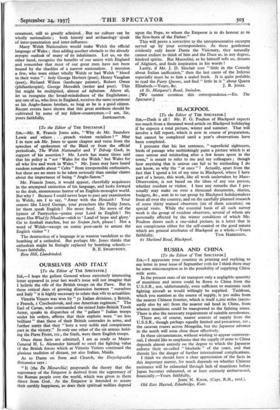OURSELVES AND ITALY
[To the Editor of THE SPECTATOR.]
Sni,—I hope the gallant General whose extremely interesting letter appeared in your last week's issue will not imagine that I belittle the role of the British troops on the Piave. But in these critical days of growing dissension between " ourselves and Italy " it is highly necessary to relate that role to actualities.
Vittorio Veneto was won by " 51 Italian divisions, 3 British, 2 French, I Czechoslovak, and one American regiment." The Earl of Cavan, who commanded the mixed halo-British Tenth Army, speaks in dispatches of the " gallant " Italian troops under his orders, affirms that their exploits were " no less brilliant " than those of their British comrades in arms, and further states that they " bore a very noble and conspicuous part in the victory." In only one other of the six armies hold- ing the Piave Front, viz., the Sixth, were there English troops.
Once these facts are admitted, I am as ready as Major- General H. L. Alexander himself to extol the fighting value of the British forces which at Vittorio Verieto continued the glorious tradition of distant, yet also Italian, Maida.
As to Dante on State and Church, the Encyclopaedia Britannica says :
" It (the De Monarchia) propounds the theory that the supremacy of the Emperor is derived from the supremacy of the Roman people over the world, which was given to them direct from God. As the Emperor is intended to assure their earthly happiness, so does their spiritual welfare depend
upon the Pope, to whom the Emperor is to do honour as to the first-born of the Father."
This will prove a corrective to the unrepresentative excerpts served up by your correspondents. As these gentlemen evidently only know Dante the Visionary, they naturally cannot endure to think of him and the Duce as, in any degree, kindred spirits. But Mussolini, as he himself tells us, dreams of Alighieri, and finds inspiration in his words !
Lastly, if Mr. J. D. Sinclair sees " little in the Comedy about Italian unification," then the last canto of the Inferno especially must be to him a sealed book. It is quite poisible, to read the Faery Queene, and find " little in it " about Queen
Elizabeth.—Yours, &c. J. B. JONES. 18 St. Margaret's Road, Swindon.
[We cannot continue this correspondence.—En. The Spectator.]


















































 Previous page
Previous page